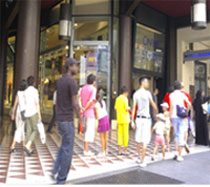Big brother – you may be watching but how much should you see?
Release Date 12 August 2011

From CCTV to publicly accessible web-cams, video technology plays a large part in our everyday lives, but as it rapidly evolves is our right to privacy being ignored? The University of Reading is to lead a new €5.3m European Union funded research centre that will examine the social and ethical challenges the industry faces.
One area the new Centre will examine is the possibility of integrating video analysis and context information to provide privacy-awareness filtering at the camera end, reducing the amount of unnecessary CCTV recording. These cameras can be taught to spot, and in turn record, only people or events of potential interest to organisations such as the police, with the ability to delete irrelevant persons/objects needlessly captured in the image. This technology would allow both event-spotting-and-alerting as well as recording and transmission, making retrieval of significant images more efficient. This would be particularly helpful when having to examine footage from a huge number of cameras during live situations, such as events last week.
The use of video technology in security is a contentious issue with unclear privacy laws. A UK Borough Council recently lost a landmark ruling for using CCTV to spy on the movements of a family to verify they resided in a given school catchment area.
CCTV cameras are an effective tool used by the police to combat crime. However, access to private information about an innocent bystander's lifestyle that is also captured and may be liberally processed, perhaps for criminal intent, could be construed as dangerous and an assault on their right to privacy. The News of the World's illegal access to people's phone messages is a prime example.
Reading and its project partners have established the European Virtual Centre of Excellence for Ethically-guided and Privacy-respecting Video Analytics (VCE VideoSense), the first centre of its type. It brings together leaders in video analytics with the aim of ensuring that ethical and privacy issues are taken into account when developing security video technology, rather than as an after-thought.
Professor Atta Badii, the Director of the new Centre who also leads the Intelligent Systems Research Laboratory at the University of Reading's School of Systems Engineering said: "The University of Reading and the VideoSense Consortium are delighted to announce the launch of the VCE. Video analytics is a controversial but an important technology. The current phone-hacking controversy has highlighted how vulnerable our privacy is in what is a fast-moving technological world.
"We must ensure that ethical and privacy issues are taken into account so we are afforded both the security protection and privacy respect we deserve, and not one at the expense of the other. With this new European Centre of Excellence, together with world-class research centres in video analytics, privacy law and ethics, we are embarking on a rolling programme of open innovation in socio-ethically responsible technology which shall be ‘privacy preserving'. This will ensure any intrusion on people's privacy is minimised by design, and not simply assumed to be an inevitable price of national security protection."
The partners in this project are Queen Mary College London (UK), Ecole Polytechnique Federal De Lausanne (Switzerland), Technical University of Berlin (Germany), the International Forum for Biophilosophy (Belgium), and EURECOM (France) as well as industrial research centres from Thales Group (France) and ISDEFE (Spain).
For more information please visit the Videosense website or contact Professor Atta Badii at 0118378 7842 or e'mail Professor Badii
Ends
For more information, please contact James Barr, press officer, on 0118 378 7115 or email j.w.barr@reading.ac.uk
Notes to Editors:
The Intelligent Systems Research Laboratory is a multi-disciplinary research unit at the School of Systems Engineering at the University of Reading; The School of Systems Engineering brings together a unique mix of expertise in information technology, computer science, cybernetics and electronic engineering. It conducts outstanding research and provides quality education, whilst working closely with business and international partners.
The University of Reading is one of the UK's top research-intensive universities. The University is ranked in the top 20 UK higher education institutions in securing research council grants worth nearly £10 million from EPSRC, ESRC, MRC, NERC, AHRC and BBSRC. In the latest Research Assessment Exercise (2008), over 87% of the University's research was deemed to be of international standing. Areas of particular research strength recognised include meteorology and climate change, typography and graphic design, archaeology, philosophy, food biosciences, construction management, real estate and planning, as well as law.
The new Centre will welcome collaboration from additional world-class centres with an established track record of innovation in socio-ethically intelligent video analytics.
